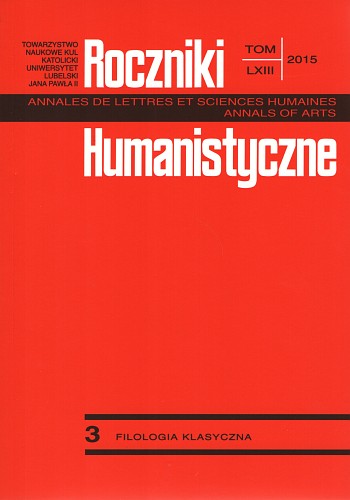Epigrammata longiora sine vitio. Egzemplifikacje Jakuba Masena w cyklu Narodzenie Chrystusa
Epigrammata longiora sine vitio. Jacob Masen’s long-short epigrams in the cycle De Christo nato
Author(s): Jarosław NowaszczukSubject(s): Philology
Published by: Towarzystwo Naukowe KUL & Katolicki Uniwersytet Lubelski Jana Pawła II
Keywords: Jesuit epigram;Jakob Masen theory;Epigrams of the birth of Christ;brevity of expression;long epigrams
Summary/Abstract: The German Jesuit, Jacob Masen, in his poetics treatise entitled Ars nova argutiarum, in addition to the theoretical content, he presents work he prepared himself illustrating the concepts under discussion. Unlike in the earlier part of the work, in Chapter 8 of his dissertation, he presents elaborate poems. He divides them into two cycles. This article is concerned with epigrams on Christmas, which appear in the collection entitled De Christo nato. Out of this group of nine, seven were translated and analysed, and although they were considered by the author as long, their length did not exceed the commonly accepted length for such type of work. As it turned out, the poems prove in many places the author’s erudition. He uses vivid vocabulary, extraordinary words and words originating from mythology and poetic neologisms. At the same time he introduces a wide range of stylistic devices and figures of speech. By the use of descriptio rerum a partium numeratione his topics are presented in an extremely vivid way. The starting point for his descriptions is often the Child Jesus himself depicted from the perspective of an ordinary observer or a conscious of things theologian. Some other time, the scholar starts from the circumstances of the event (circumstantiae) and on their basis the whole performance is built. All the poems are built based on the theory of sources (fontes) and veins (venae) expounded in the dissertation. These pieces of his work are not so much within the rhetorized poetry as within poetry guided by logic. They do not have particularly distinct argutias but this is also in line with the preliminary assumption made by the poet. On the other hand they all form a sort of itinerarium necessary to understand baroque poetry which often, due to its intricacy, appears to be not much interesting and even worthless. It is enough to analyse just a few epigrams by Masen to see that to find the whole range of ideas and solutions concealed by the poet in his poems unconventional literary methods should be used within his poetry.
Journal: Roczniki Humanistyczne
- Issue Year: 63/2015
- Issue No: 03
- Page Range: 123-147
- Page Count: 25
- Language: Polish

